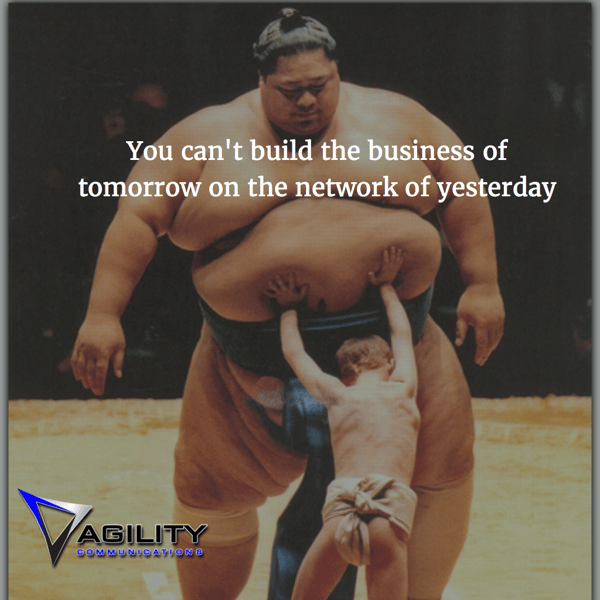All day everyday I talk to business owners and IT administrators about technology for business. Over the years I've come to notice an all too common thread among many small business owners that you do not find in larger enterprises as much. Its a certain mentality that keeps those business owners from improving the performance of their business operations and their employees. After I explain what I mean I'll also show why businesses need to invest properly in technology to improve performance, customer experience and reduce technology frustration.
Lets start with a few examples to help illustrate the mindset. When you go to purchase a new cell phone you typically look at the latest and greatest technology from Apple or Google, you rarely if ever look at the phone with basic performance like texting, basic apps and simple camera or dare I say the old flip phone they carry for the elderly less technical people. It might cost dramatically less but who wants an iPhone 5 when they just came out with the 11 Pro? Right? Typically we want the best we can get and we stretch the budget to get it. Now there are those few who don't need the best, I have a close friend who up until 6 months ago was still using the iPhone 4...how he ran apps I will never know. Eventually he was forced to upgrade but he waits until hes forced to because he's frugal and doesn't really use all the advancements.

Another example would be when you go to buy a new truck. Do you run down to the same used lot that you would take your 16yr old to, hoping to find an old truck that still runs good but is less expensive than a newer one? No, you probably look at the brand new truck and end up stretching the budget for as close to new as you can get. You still get most of the new technology but you don't have to pay that initial depreciation right? What about buying life insurance? Do you find the cheapest advertised plan with basic coverage with the hopes that your wife or husband is left with enough to cover funeral costs or do you shop for the plan that guarantees a $500,000 or more payout in the event that you die? My guess is most of go for the better plan for the peace of mind to know our loved ones are taken care of.
Now lets talk about business. There a few things required for just about any business to be conducted. Most of the time you need an office or retail location for your customers to visit and see your products. If your doing business strictly online you'll still need a location for your employees, inventories etc. That is typically the biggest expense outside of labor costs etc for employees that any business has. The next critical piece is Internet and phones. After all without the Internet or a phone line you couldn't run a single credit card transaction. Without the Internet or a phone you're customers couldn't find you or talk to you. Take any business up and down main street and there isn't a single one that can survive without a business phone and an Internet or network connection of some sort. Its absolutely critical to any business. Even using a cell phone can only accomplish so much, at the very least you need a solid Internet connection. If you have multiple locations that all need to share a server for tracking transactions and inventory or running business software you have to have connectivity from all sites to that server wherever it is.
In my previous examples of consumer spending we noticed the mindset that we as consumers want the best product, with the newest technology we can get within our budget and we'll stretch to get it. The troubling mindset that I've noticed in many small businesses is the complete opposite... the idea of trying to get by with the cheapest technology available. I've seen business owners buy cheap wireless Internet after hearing an ad on the radio. It promises 100mb for $60 a month. To those of us in the technology business we understand that wireless is a best effort service that is effected by weather, line of site, interference etc. We also understand that best effort means that under perfect conditions you "might" get 100mb but likely you will most often get closer to 35mb or less. We also know that the upload speed will be poor so running any VoIP etc will be poor quality. The business owner being ever frugal learns that the hard way and then rather than invest in the proper technology and right tools he goes to the next cheapest thing and tries either another provider or upgrades to cable/DSL broadband. All the while being frustrated and stressed because the technology that is most crucial to his business is not working. This is an improvement for sure but its still a consumer grade product that is not engineered for steady bandwidth capable of millions of transactions, VoIP, music streaming etc. So while our business owner notices a small improvement or even gets by for a few months without too many hiccups he's still gambling with cheap technology that ultimately will frustrate him with down time and intermittent issues.
Technology even at the very cutting edge is not always 100% reliable but investing in better technologies like fiber optics, dedicated circuits, business grade routers and switches, carrier provided VoIP business phones makes all the difference in the world. High quality solutions improve reliability by leaps and bounds, the technology is more secure and offers features that make employees more productive. Fiber Internet for example may cost $185 a month compared to cable at $90 but fiber offers dedicated bandwidth speeds for upload and download. Cable offers a decent download speed but very little upload meaning you'll see more dropped calls, you won't be able to perform as many functions at any given time as you will with Fiber. Fiber is dedicated to your business, Cable is a shared service meaning the speeds will fluctuate as more users get online. Stretching to get the best technology within your budget is the better move for customer experience and improved performance. Same is true for business phones, site to site connectivity. Its amazing to me that the same business owner who refuses to stretch to $300 for fiber will then turn around and drop $5000 a month on advertising. Now one might argue without the advertising we'd have no customers but without Internet and phones you couldn't make a single sale. Advertising comes with lots of expense and zero guarantee of return. Technology guarantees a certain performance based on how much you invest. The ration between the two should be closer.

Because of this small business mindset, technology providers are continually trying to create ways for businesses buy more cheap technology. Why sell you one if I can sell you two...that's the goal for some providers. Case in point SD WAN (software defined networking) the argument here is why buy an expensive MPLS connection when you can get away with 2 broadband connections. Yes you read that right...they want to sell you a box that does VPN (old technology that encrypts a tunnel across the internet for connectivity) and the argument is since one broadband connection is not solid enough we'll load balance between two broadband connections. The end result? We sell you two Internet circuits at every location and a shiny new box that you can manage in the cloud. If the average 100mb cable circuit is $100 and the managed SD WAN solution is $100 you have an extended cost for that location of roughly $300 ( 2 circuits and 1 box). Well with the ongoing reduction in the cost of bandwidth the same business owner could purchase a single 200mb private fiber optic connection for the same money and still get a managed router. Fiber technology is more reliable, more secure and better performing that broadband. You tell me...would rather depend on 2 best effort broadband circuits or 1 solid fiber optic circuit? The cost is roughly the same although they will tout it as cheaper.
Don't get me wrong, all of the technologies I've mentioned have their place. For example wireless Internet makes a great inexpensive backup solution in the case of a catastrophic outage. In the example above for an additional $90 a backup wireless internet connection could be implemented. In the case of SD WAN there are some remote sites that can't get fiber optics and in those cases SD WAN is a great fit. The point is if you want your business to perform on a consistent basis with little downtime, and you want feature rich solutions that simplify operations in your company and improve employee productivity its critical that you invest in better technology. Consumer grade solutions will not support a growing business, its like expecting your 12 yr old son to run the business the way you do, he just doesn't have the capacity to do it at that age. We like to say "You can't build the business of tomorrow on the network of yesterday".


